
Welcome to the long overdue instalment three of our brief mini-series of weekly instalments focussed on the career of Admiral Karl Dönitz. I tender no excuse other than the life and times of a news writer can be both an exciting and a busy one.
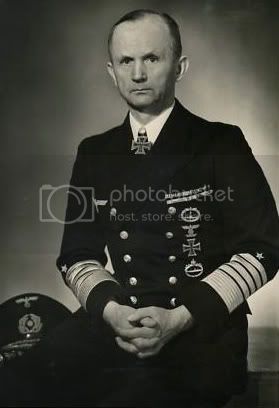
The Second World War and its impact on the family of Karl Dönitz was tragic –with both of Dönitz's sons dying during World War II.
His younger son, Peter, was a watch officer on U-954 and was killed on the 19th of May 1943, when his boat was sunk in the North Atlantic with the loss of its entire crew.
After this tragic loss, the older brother, Klaus, was permitted to leave combat duty and began studying to be a naval doctor. Sadly Klaus would be killed on the 13th of May 1944. after he convinced his friends to let him go on the torpedo boat S-141 for a raid on HMS Selsey off the coast of England on his twenty-fourth birthday. The boat was destroyed and Klaus died, even though six others were rescued.
Dönitz’s daughter Ursula married the U-boat commander and Knight's Cross holder Günther Hessler in November 1941.
Following the war, Dönitz was held as a prisoner of war by the Allies. He was indicted as a major war criminal at the Nuremberg Trials on three counts:
(1) Conspiracy to commit crimes against peace, war crimes, and crimes against humanity;
(2) Planning, initiating and waging wars of aggression; and
(3) Crimes against the laws of war.
Among the war-crimes charges, he was accused of waging unrestricted submarine warfare for issuing War Order No. 154 in 1939, and another similar order after the Laconia incident in 1942, not to rescue survivors from ships attacked by submarine. By issuing these two orders he was found guilty of causing Germany to be in breach of the Second London Naval Treaty of 1936.
However, as evidence of similar conduct by the Allies was presented at his trial, his sentence was not assessed on the grounds of this breach of international law. Dönitz was found not guilty on count (1) of the Indictment, but guilty on counts (2) and (3) and was sentenced to ten years in prison.
On the specific charge of ordering unrestricted submarine warfare he was found "[not] guilty for his conduct of submarine warfare against British armed merchant ships",but the judges found that "Doenitz is charged with waging unrestricted submarine warfare contrary to the Naval Protocol of 1936 to which Germany acceded, and which reaffirmed the rules of submarine warfare laid down in the London Naval Agreement of 1930. ... The order of Doenitz to sink neutral ships without warning when found within these zones was, therefore, in the opinion of the Tribunal, violation of the Protocol. ... The orders, then, prove Doenitz is guilty of a violation of the Protocol. ... the sentence of Doenitz is not assessed on the ground of his breaches of the international law of submarine warfare".
His sentence on unrestricted submarine warfare was not assessed, because of similar actions by the Allies, in particular of an order of the British Admiralty announced on the 8th of May 1940, according to which all vessels should be sunk on sight in the Skagerrak, and the answers to interrogatories by Fleet Admiral Chester Nimitz, wartime commander-in-chief of the United States Pacific Fleet, stating unrestricted submarine warfare had been carried on in the Pacific Ocean by the United States from the first day that nation entered the war, Dönitz's order to conduct unrestricted submarine warfare was not officially included in his sentence.
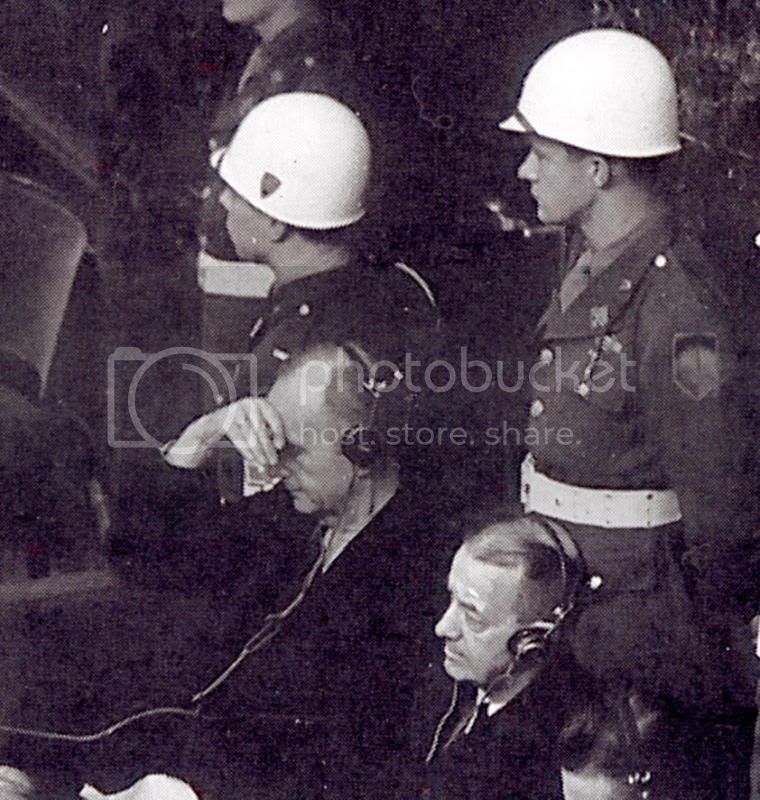
Dönitz disputed the righteousness of his trial at Nuremberg, saying, "One of the ‘accusations' that made me guilty during this trial was that I met and planned the course of the war with Hitler; now I ask them in heaven's name, how could an admiral do otherwise with his country's head of state in a time of war?". Numerous Allied officers also sent letters to Dönitz conveying their disappointment over the fairness and verdict of his trial.
He was imprisoned for ten years in Spandau Prison in West Berlin.
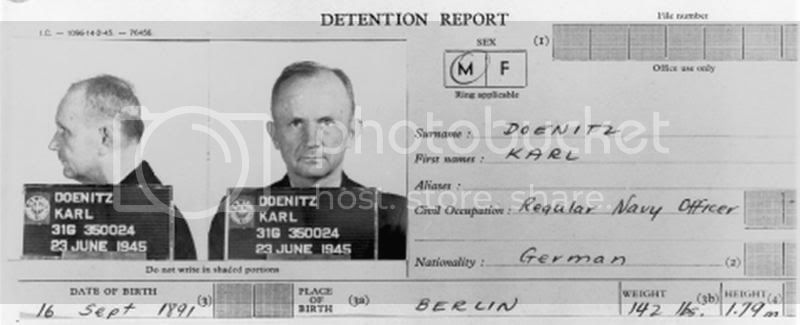
Dönitz was released on the 1st of October 1956, and he retired to the small village of Aumühle in Schleswig-Holstein in northern West Germany. There he worked on two books.
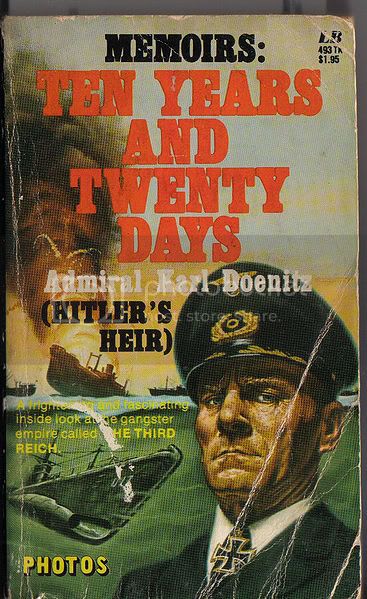
His memoirs, Zehn Jahre, Zwanzig Tage (Memoirs: Ten Years and Twenty Days), appeared in Germany in 1958 and became available in an English translation the following year. This book recounted Dönitz's experiences as U-boat commander (ten years) and President of Germany (twenty days). In it, Dönitz explains the Nazi regime as a product of its time, but argues he was not a politician and thus not morally responsible for much of the regime's crimes. He likewise criticizes dictatorship as a fundamentally flawed form of government and blames it for much of the Nazi era's failings.
Dönitz's second book, Mein wechselvolles Leben (My Ever-Changing Life) is less known, perhaps because it deals with the events of his life before 1934. This book was first published in 1968, and a new edition was released in 1998 with the revised title Mein soldatisches Leben (My Life as a Soldier). Most editions today combine Mein wechselvolles Leben and Mein soldatisches Leben into a single volume.
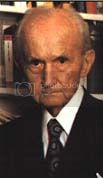
Late in his life, Dönitz's reputation was rehabilitated to a large extent and he made every attempt to answer correspondence and autograph postcards for others. Unlike Albert Speer, Dönitz was unrepentant regarding his role in World War II since he firmly believed that no one will respect an individual who compromises with his belief or duty towards his nation in any way, whether an individual's betrayal was small or big. Of this conviction Dönitz writes (commenting on Himmler's major betrayal):
“The betrayer of military secrets is a pariah, despised by every man and every nation. Even the enemy whom he serves has no respect for him, but merely uses him. Any nation which is not uncompromisingly unanimous in its condemnation of this type of treachery is undermining the very foundations of its own state, whatever its form of government may be.”[
Dönitz died of a heart attack on 24 December 1980, in Aumühle. As the last German officer with the rank of Grand Admiral, he was honored by many former servicemen and foreign naval officers who came to pay their respects at his funeral on the 6th of January 1981. However, he had only received the pension pay of a Captain because the West German government ruled all of his advances in rank after that had been due to Hitler
Decorations
7 November 1914 : Iron Cross 2nd class (EK II)
5 May 1916 : Iron Cross 1st class (EK I)
18 September 1939 : Spange 1939 zum EK II 1914
20 December 1939 : Spange 1939 zum EK I 1914
27 February 1940 : U-Bootkriegsabzeichen
21 April 1940 : Knights Cross (3.)
6 April 1943 : Knights Cross with Oak Leaves (21.)
Ranks
1 April 1910 : Seekadett
15 April 1911 : Fähnrich zur See
27 September 1913 : Leutnant zur See (U)
22 March 1916 : Oberleutnant zur See(Q)
10 January 1921 : Kapitänleutnant (3.)
1 November 1928 : Korvettenkapitän (3.)
1 October 1933 : Fregattenkapitän (8.)
1 October 1935 : Kapitän z. See (2.)
28 January 1939 : Kommodore
1 October 1939 : Konteradmiral (3.)
1 September 1940 : Vizeadmiral (2.)
14 March 1942 : Admiral (3.)
30 January 1943 : Grossadmiral
In compiling each instalment I make reference to a number of established reputable sources both web and reference books.
It is acknowledged that a part or portion of the above information may have been sourced from the following sources and credit is duly acknowledged:
Footnote
In compiling each instalment I make reference to a number of established reputable sources both web and reference books.
It is acknowledged that a part or portion of the above information may have been sourced from the following sources and credit is duly acknowledged:
Bibliography – websites
Wikipedia
www.u-boat.net/
www.u-boataces.com
www.historylearningsite.co.uk
www.uboatarchive.net/
www.u-boat-reich.co.uk
www.karl.donitz.com
Bibliography – books
U-Boats at War
U-Boats in Action Squadron/Signal
U-Boats Destroyed: German Submarine Losses in the World Wars by Paul Kemp
Dönitz and the Wolf Packs by Bernard Edwards
Wolf, U-Boat Commanders in World War II by Jordan Vause
German U-Boat Crews 1914-45 by Gordon Williamson and illustrated by Darko Pavlovic
Neither Sharks nor Wolves - The Men of Nazi Germany's U-Boat Arm 1939-1945 by Timothy P Mulligan
KRIEGSMARINE U-BOATS: 1939 - 1945 by Chris Bishop
Shooting the War: The Memoir and Photographs of a U-Boat Officer in World War II by Otto Giese and James E. Wise
U-Boats: The Illustrated History of the Raiders of the Deep by David Miller
Wolf Pack: The Story of the U-Boat in World War II (General Military) by Gordon Williamson
The U-Boat: The Evolution and Technical History of German Submarines by Eberhard Rossler
Hitler's U-Boat War: The Hunters, 1939-1942 (Modern Library War) by Clay Blair
Wolf: U-Boat Commanders in World War II by Jordan Vause
Silent Hunters: German U-Boat Commanders of World War II (Bluejacket Paperback Series) by Theodore P. Savas
The Reichsmarine 1919–1935 - Jason Pipes
Kriegsmarine - The Navy 1935–1945 - Jason PipesU-Boat Commander: A Periscope View of the Battle of the Atlantic. 1984. Cremer, PeterThe Trial of the Germans: Account of the Twenty-two Defendants Before the International Military Tribunal at Nuremberg. 1997. Davidson, Eugene.U-Boats Against Canada: German Submarines in Canadian Waters. McGill-Queen's University Press: 1985. Hadley, Michael L.U-boat Killer. 1999. Macintyre, Donald.Iron Coffins: A U-boat Commander's War, 1939–45. 1999. Werner, Herbert A
Fortunes of War: U-boat Commander. 2000. Prien, Gunther
Innovation ignored: The Submarrine problem in Murray, Williamson and Millet Allan R. ed. "Military Innovation in the Interwar Period". Cambridge University Press 1998 Herwig, Holger H
Failure to Learn: American Anti-submarine Warfare in 1942 in Cohen, Eliot A. and Gooch, John. Military Misfortunes Vintage Books 1991
Grossadmiral. Memoirs: Ten Years and Twenty Days. Da Capo Press, USA, 1997. Dönitz, Karl, (reprints 1958 German-language Athenäum-Verlag edition).
Die Träger des Ritterkreuzes des Eisernen Kreuzes 1939-1945. Friedburg, Germany: Podzun-Pallas. Fellgiebel, Walther-Peer
"Befehlshaber der Unterseeboote (BdU) Karl Dönitz." at Uboat.net. Guðmundur Helgason.
Knight's Cross Holders of the U-Boat Service. Schiffer Publishing Ltd. Kurowski, Franz (1995).
.Dönitz: The Last Führer. Cassell & Co, UK, 2001 Padfield, Peter
Die Ritterkreuzträger der Kriegsmarine. Stuttgart, Germany: Motorbuch Verlag. Range, Clemens (1974).
Die Ritterkreuzträger Die Inhaber des Ritterkreuzes des Eisernen Kreuzes 1939 von Heer, Luftwaffe, Kriegsmarine, Waffen-SS, Volkssturm sowie mit Deutschland verbündeter Streitkräfte nach den Unterlagen des Bundesarchives (in German). Jena, Germany: Scherzers Miltaer-Verlag. Scherzer, Veit (2007).
Doenitz: The Last Fuhrer by Peter Padfield
Doenitz at Nuremberg: A Re-Appraisal by H.K. Thompson and Henry Strutz
Capitulation 1945 by Dr. Marlis Steinert









